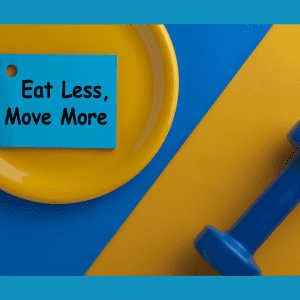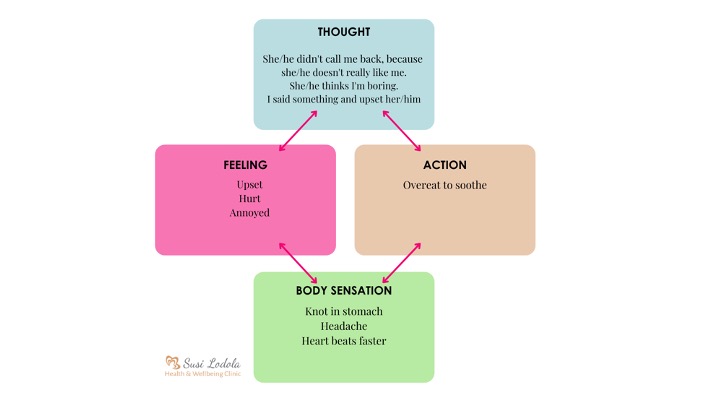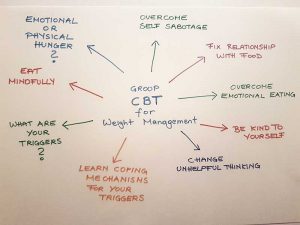Losing weight and maintaining weight loss remains a difficult challenge. We know from research that over 90% of people regain weight, and often more weight than they have initially lost.
How is this possible when there are so many diet programms, fitness programms and apps promoting weight loss? In addition, there are more and more low fat, low sugar, low-calorie foods available and yet there is a global obesity problem. So clearly, eating less and moving more is not the full answer.
I have studied clinical research and completed a Masters Degree in weight management, because I had a personal interest in the topic, having struggled with my weight all my life.
From research, we now know that there is a connection between weight gain/weight loss and psychological factors such as self-esteem, quality of life, stressful life events, eating disorders, mood problems, anxiety, and personality traits. In addition, we know from research that over 60% of people who are overweight are emotional eaters.
Changing your relationship with food, losing weight, keeping it off, and improving your fitness, is a physical as well as a psychological process.
The reason why various diet and exercise programmes do not show positive long-term results in weight management is, they do not address underlying psychological issues of why you overeat and how your mind is key to changing your relationship with food.
In order to address those underlying issues, CBT has been identified to be a key component to help people achieve weight loss in a sustainable and successful manner.
So what is Cognitive Behaviour Therapy (CBT) and how can it help you lose weight?
Losing weight and maintaining it, requires learning new mental skills and identifying thinking patterns and behaviours which have hindered your weight loss in the past. Learning those new mental skills and behaviours will rewire your brain and help you make lasting changes.
CBT is a form of psychotherapy that was pioneered by Dr. Aaron T. Beck in the 1960s and since its introduction, CBT has been studied in thousands of research studies and it has been shown to be effective in treating a wide variety of conditions. CBT for weight loss has been shown in numerous international studies as being an important element in any weight management approaches. It is also recommended by international clinical guidelines as a crucial component to treating obesity.
This is how it works:
The CBT model is defined as “What you think, influences what you do and how you feel. Humans function in a way that your thoughts, feelings and behaviours are all linked and cannot exist in isolation, as demonstrated in the model below.
THE CBT MODEL
Most people believe that a particular situation or circumstances are causing them to eat something they hadn’t planned. However, it is not the situation, it is the thoughts that make you behave a certain way.
For example, you may feel stressed or tired at the end of the week and believe that stress and tiredness cause you to order a takeaway/drink a bottle of wine etc. The fact is, it is never the situation that makes you behave a certain way, It is actually your thinking about the situation/trigger which leads to overeating.
Those thoughts are something like “I had a stressful week, I deserve….” or I am too tired I will have some chocolate to keep me going”, or ” eating something is the only thing to help me calm down”. Those are sabotaging thoughts, which occur once you are in a trigger situation.
CBT will help:
- Identify your specific trigger situation
- Identify your sabotaging thoughts
- Identify your unhelpful habits
- Identify your emotions around food
- Change the way your thoughts lead to unhealthy behaviours
- Change your unhealthy habits
On the programme, I apply scientifically proven psychological tools to help you change your sabotaging thoughts and learn new helpful habits and behaviours.
The tools and techniques which will help you to:
- overcome emotional eating
- identify sabotaging th
oughts and behaviours
- achieve a positive attitude towards food
- how to motivate yourself and stay motivated
- achieve a positive body image
- understand neuroplasticity and how the brain can be rewired to think in a different way
- become more tuned into your eating habits through mindfulness
- understand the difference between hunger and cravings and how to overcome cravings
- increase your self-confidence
- learn how to stay on track
CBT will help you rewire your brain and I like to show my clients a little video that explains how rewiring takes place. Click this link and have a look
If you would like to find out more about CBT you can sign up below for my newsletter and I will send you my ebook which has lots of tips on changing habits and how you can take simple steps to change your lifestyle and lose weight.
[activecampaign form=5]





 oughts and behaviours
oughts and behaviours
